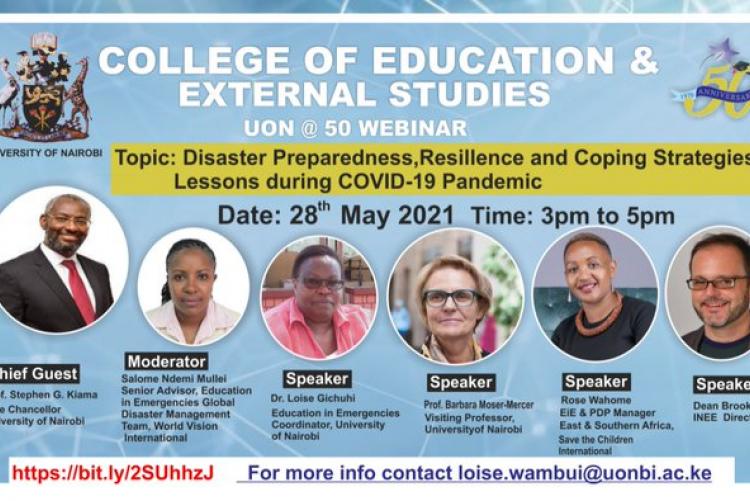Dr. Loise Gichuhi, an Education in Emergency specialist organized a panel discussion to discuss “Disaster Preparedness, Resilience and coping strategies: Lessons Learnt during COVID-19 pandemic” the panellists were; Prof. Barbara Moser-Mercer, Visiting Professor, University of Nairobi. Rose Wahome, Regional EiE & PDP Manager, East and Southern Africa, Save the Children, Salome Ndemi Mullei, Senior Advisor, Education in Emergencies, Global Disaster Management Team, World Vision International and Dean Brooks, Director, The Inter-agency Network for Education in Emergencies.
Highlights of Presentations and discussions:
Dr. Gichuhi made a presentation on ”Unexcused Dilemma- Complexity of COVID19 and Building of Resilience” In March 2020, schools closed their doors across the globe, and more than 1.5 billion students worldwide ceased to learn in the physical classrooms or in any style they knew before. This posed an unprecedented dilemma across the globe. To address this dilemma, Dr. Gichuhi proposed “Policymakers must talk loudly and strategically to reverse any equitable and inclusive damages and ensure the SDG4 gains achieved so far are not reversed. Need to reinvest and scale-up digital learning skills and specifically address the digital divide for equitable and inclusive progress. Must have better data to inform policy and develop achievable commitments. Dr. Gichuhi ended her presentation by urging Universities to safeguard and build a Resilient Student that is able to withstand the Challenges of Covid19 and beyond
Prof. Barbara Moser-Mercer spoke about “Resilient Learners” Her presentation brought out the 6 domains of resilience that are necessary for the 21st-century learner. “Social-emotional well-being builds over time - all components are vital for resilience” she added. For students to better cope with adversity, they need to build strong social relationships which will, in turn, enhance resilience
Dean Brooks gave a detailed presentation of the key role The Inter-agency Network for Education in Emergencies (INEE) is playing to ensure the right to a quality, safe, and relevant education for all who live in emergency and crisis contexts through prevention, preparedness, response, and recovery. INEE is an open, global network of more than 18,000 individual members, affiliated with more than 4,000 organizations in 190 countries. Dr. Gichuhi is a Country Focal Point for the Inter-Agency Network for Education in Emergencies (INEE)
Full presentations: HERE
- Log in to post comments

